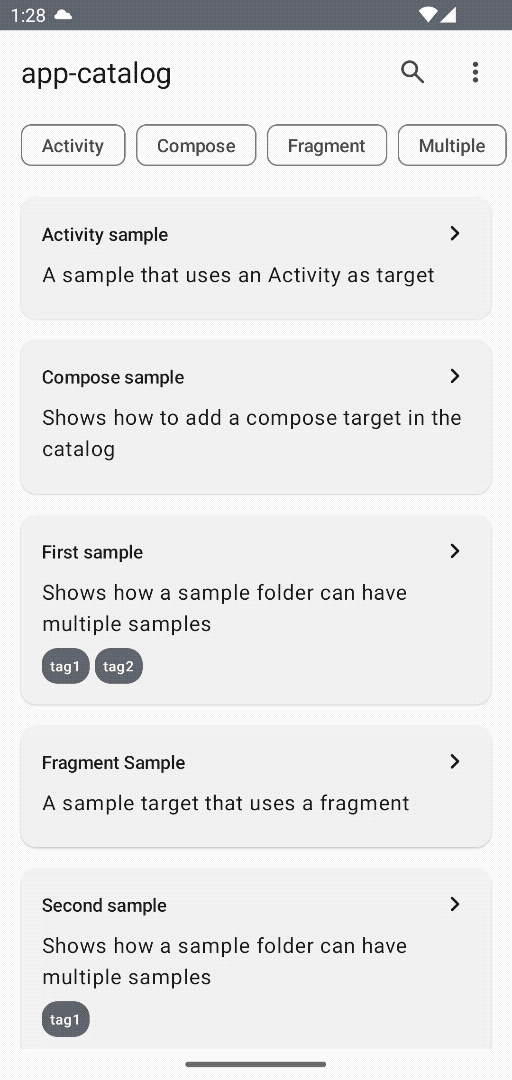(CASA or "Home" in Spanish)
A framework to bootstrap the creation of catalog samples apps by removing all the boilerplate and dynamically including all available samples into a single activity.
🚧 Work in-progress: this is an experiment project and it is under heavy development, APIs might change frequently.
Three main steps:
Note: you can also check the app-catalog folder for an example.
Create a project with the following structure (names can be changed):
- app
- samples/
- first
- second
Note: the framework supports nested folders too (e.g samples/folder/first, samples/folder/second..)
For example, the settings.gradle might look like this:
include ':app'
include ':samples:sampleOne'
include ':samples:sampleTwo'
// ...other samplesThis will be the application module that wires all the samples under a single app. It requires three steps:
- Set up build.gradle
- Create the catalog activity and app classes
- Setup
AndroidManifest.xml - [Optional] provide sourcecode, documentation and bug report URLs
In the app module's build.gradle include the framework dependencies, Hilt and KAPT plugins:
plugins {
id 'com.android.application'
id 'org.jetbrains.kotlin.android'
id 'kotlin-kapt'
id 'dagger.hilt.android.plugin'
}
android {
// your app's configuration
}
dependencies {
implementation "com.google.android.catalog.framework:casa-ui:$version"
implementation "com.google.dagger:hilt-android:2.44.2"
kapt "com.google.dagger:hilt-android-compiler:2.44.2"
// include all module samples.
}Then, create a new Activity that extends CatalogActivity and add the Hilt wiring for the
Application and Activity entry points:
@HiltAndroidApp
class MainApp : Application()
@AndroidEntryPoint
class MainActivity : CatalogActivity()Finally, don't forget to declare them in the AndroidManifest.xml:
<application android:name=".MainApp" android:allowBackup="true">
<activity android:name=".MainActivity" android:exported="true">
<intent-filter>
<action android:name="android.intent.action.MAIN" />
<category android:name="android.intent.category.LAUNCHER" />
</intent-filter>
</activity>
</application>The framework provides quick access to the sourcecode, documentation, bug report or owner of a sample in the default UI toolbar.
To enable it, provide the base URLs and use the @Sample annotation parameters
<resources>
<string name="app_name">app-catalog</string>
<string name="source_base_url">https://github.com/google/casa-android/tree/main/app-catalog/samples/%1$s</string>
<string name="documentation_base_url">https://github.com/google/casa-android</string>
<string name="bug_report_url">https://github.com/google/casa-android/issues/new?assignees=&labels=&template=bug_report.md&title=%1$s</string>
<!-- owner as github username -->
<string name="owner_base_url">https://github.com/%1$s</string>
<!-- owner as email -->
<string name="owner_base_url">mailto://%1$s</string>
</resources>Note: the resources can take one optional string argument by adding %1$s.
Place any new samples under the samples folder and for each new module add the framework
dependencies and plugins in their build.gradle files:
plugins {
id 'com.android.library'
id 'kotlin-android'
id 'kotlin-kapt'
id "com.google.devtools.ksp"
id 'dagger.hilt.android.plugin'
}
android {
// your configuration
}
// See https://kotlinlang.org/docs/ksp-quickstart.html#make-ide-aware-of-generated-code
kotlin {
sourceSets {
main.kotlin.srcDirs += 'build/generated/ksp/main/kotlin'
test.kotlin.srcDirs += 'build/generated/ksp/test/kotlin'
}
}
dependencies {
implementation "com.google.android.catalog.framework:casa-base:$version"
ksp "com.google.android.catalog.framework:casa-processor:$version"
implementation "com.google.dagger:hilt-android:2.44.2"
kapt "com.google.dagger:hilt-android-compiler:2.44.2"
// other dependencies like compose
}Then create as many entry points as desired by annotating any composable function, activity or
fragment with the @Sample annotation:
@Sample(
name = "Compose sample",
description = "Shows how to add a compose target in the catalog",
documentation = "https://github.com/google/casa-android#create-sample-modules"
)
@Composable
fun ComposeSample() {
Box(Modifier.fillMaxSize()) {
Text(text = "Hi, I am a compose sample target!")
}
}Each entry point will be automatically included in the main app and displayed for you.
To launch a specific sample from Android Studio you can pass the sample name or the sample path via
the am start command using the -e
parameter and the
CatalogActivity.KEY_START
key value.
-e start "Name of the sample as defined in the @Sample annotationPlease contribute! We will gladly review any pull requests. Make sure to read the Contributing page first though.


